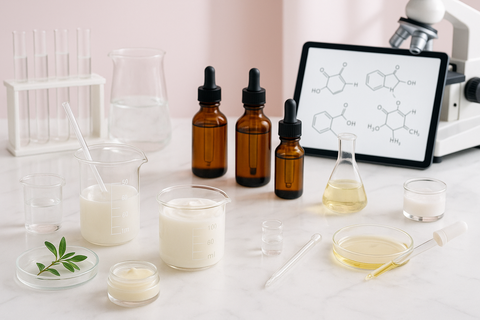Sensitive skin needs gentle care. Skincare ingredients must not cause irritation or redness. A formulator considers how skincare products interact with the skin barrier. Sensitive skin care needs careful use of cosmetic ingredients. It also needs careful use of preservatives and pH levels in lotions, serums, shampoos, and deodorant.
Selecting gentle ingredients
It is important to choose safe ingredients that are suitable for cosmetics. Natural skincare often uses plants, botanical extracts, hydrosols, and carrier oils. Simple natural ingredients like shea butter, coconut oil, jojoba oil, and essential oils can soothe skin. Strong exfoliants like alpha-hydroxy acids and beta-hydroxy acids can irritate the skin. Instead, mild cosmetic active options like vitamin C and hyaluronic acid work well.
Balancing formulas for comfort
Cosmetic formulas should have the right balance of solubilisers, emulsifiers, and surfactants. These elements keep skincare products stable and effective. In beauty products such as face masks, balms, or haircare, cosmetic preservation is essential. Preservative efficacy testing makes sure products are safe for sensitive skin. Vegan skincare and organic formulas use natural methods to make products. They perform stability testing. They also perform allergy testing. They use cosmetic calculator tools.
Testing and compliance
Testing ensures that skincare formulation is safe. Stability testing checks the quality of products. Efficacy testing also checks the quality of the product. Cosmetic notification forms, batch tracking, and COSMOS Organic certification standards help companies follow rules. Formulation worksheets and cosmetic software programs help record the formulation process. Databases of cosmetic ingredient choices help formulators make skincare products. They include cosmetic emulsifying wax and antimicrobial substances.
Educational pathways for formulators
Training builds knowledge in cosmetic formulation science. Learning helps formulators make high-quality skincare products. It also helps them follow cosmetic rules. Textbooks are useful for study. Cosmetic calculator tools are helpful. Cosmetic software programs are also helpful. Digital formats include Kindle books and Audible audiobooks. They also include paperbacks and hardcovers. These formats help people learn about cosmetic formulas. This education helps formulation labs. It also supports DIY beauty recipes and indie beauty businesses.
Practical tips for sensitive skin formulation
- Simplify cosmetic formulas to reduce irritation risk.
- Keep pH levels close to natural skin balance.
- Add botanical skincare ingredients like hydrosols and carrier oils.
- Use UV filters and cosmetic preservative strategies.
- Include allergy testing and preservative efficacy testing.
Supporting natural beauty and innovation
Natural beauty values use plant-based skincare ingredients. They also value gentle natural formulas. Communities share ideas about plant-based skincare. They also share ideas about organic formulas. They create beauty products with natural ingredients. They also use new ideas from plants in skincare. Sensitive skin products range from men’s body products to hair styling products. In addition, cosmetic active choices like retinol or vitamin C bring effective results. Formulators study different types of cosmetic formulas. This helps them achieve success in cosmetic formulation. They use recetas. They also use forms for cosmetic preservation. They use forms for cosmetic notification. These tools help create safe and creative skincare formulas.
Please contact us to get started with your custom skincare formulation today.
